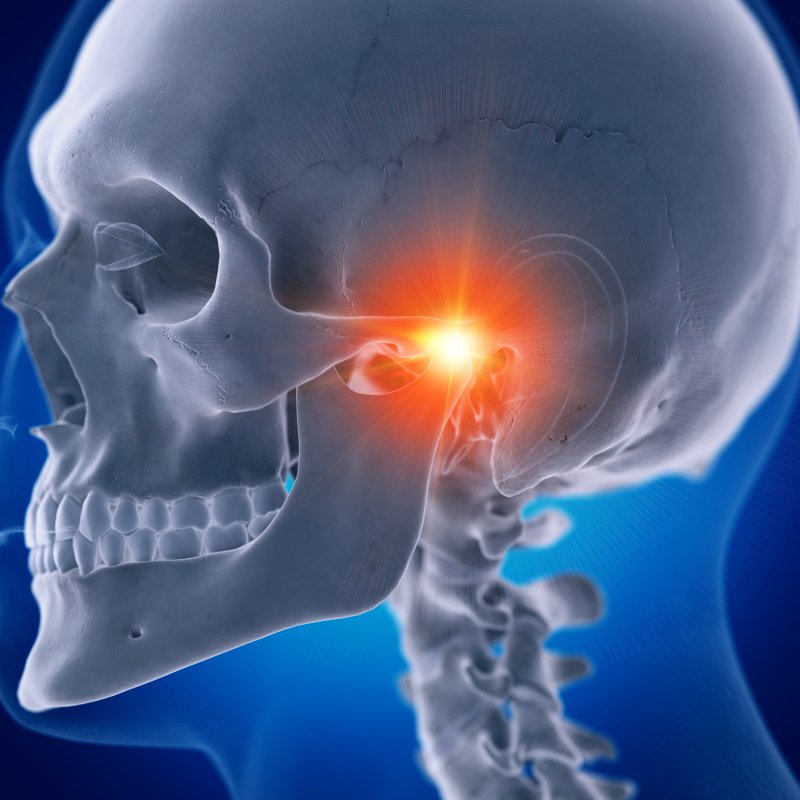You are experiencing severe temporomandibular joint (TMJ) pain but do not consider it to be bad enough that you should see a licensed dental professional. Thinking it will eventually go away on its own, you avoid the problem and try to manage your discomfort with an over-the-counter pain reliever. But does it work? Are you seeing any noticeable improvement? Or are symptoms worsening over time? Instead of neglecting your issue, learn what kind of dangers can arise when you choose to disregard chronic jaw pain.
Symptoms Associated With TMJ
You might not even realize you have TMJ if you do not know what you should look for with regard to its most common symptoms. These include:
- Pain and tenderness surrounding your jaw joint, neck, shoulders, and face
- Facial swelling
- Severe toothaches and headaches
- Difficulty hearing because of earaches
- A clicking or popping noise when opening and closing your mouth
- Difficulty chewing and eating
What Dangers Come with Untreated TMJ?
Over time, you may not realize that untreated TMJ can result in other serious problems. From the inability to achieve adequate sleep to worn tooth enamel, you may want to reconsider visiting your dentist if you want to avoid any of the following scenarios:
- Teeth grinding (bruxism): If TMJ is left untreated, the pressure placed on your jaw joints will ultimately impact your teeth. By clenching and grinding them together, you will begin to notice that your tooth enamel becomes worn down, putting it at a greater risk for decay and tooth sensitivity. This can require customized restorations should serious damage occur (i.e., breakage, chipping, or cracks).
- Sleep apnea: One of the leading symptoms of sleep apnea is insomnia. Because the jaw thrusts forward when attempting to wake during an apnea episode, the frequent reoccurrence of this action can make it difficult to get ample sleep. As a result, you may find it hard to stay awake throughout the day, especially if you woke at different times throughout the night and were unable to go back to sleep.
- Inadequate/uneven facial growth: TMJ that only presents a problem on one side of the face can lead to an overuse of these muscles, resulting in an uneven facial appearance. Bell’s palsy is a common condition that can form as a result of TMD (temporomandibular joint disorder).
Other possible dangers can include a ringing or buzzing in the ears as well as hunger because of the inability to open and close the mouth when attempting to eat nutrient-rich foods.
How a Dentist Can Help
If you suspect that you are experiencing extreme discomfort, there is a way to achieve relief – TMJ Therapy. By seeing a dentist who is skilled in treating this type of issue, you can begin to sleep and breathe better as well as move your mouth with greater ease.
A customized occlusal splint can be designed specifically for your mouth so that it relieves the pressure placed on your jaw and shifts it just enough to ensure proper positioning and alignment. They also reduce the potential for bruxism, saving your teeth from continued wear and tear.
Don’t continue to disregard your TMJ pain. Avoid the dangers associated with untreated jaw discomfort by getting the treatment you need to start living a fuller, more enjoyable life.
About the Practice
DuPont Family Dentistry has four dental professionals who all strive to meet the same goal, which is to help patients achieve happier, healthier smiles. Providing solutions to all types of oral health problems, we can provide TMJ Therapy to help individuals improve their sleep and breathing patterns and embrace better bite alignment. Instead of living with chronic jaw pain, we equip our patients with customized mouthguards to ensure greater oral function. Contact us at (253) 964-7000 to find out how we can help.

